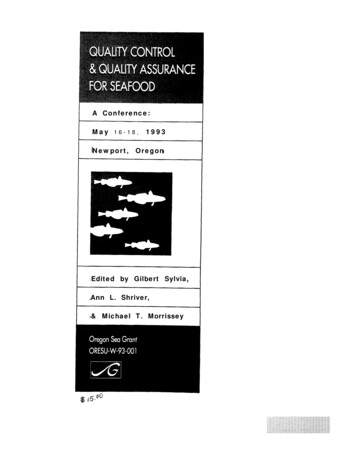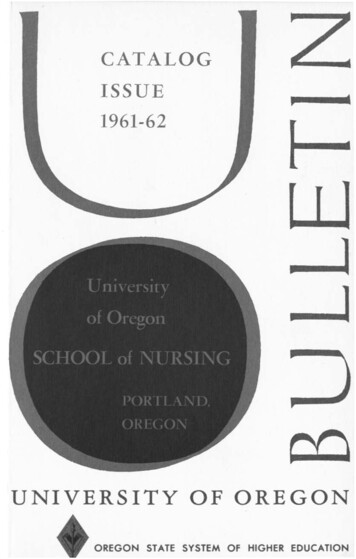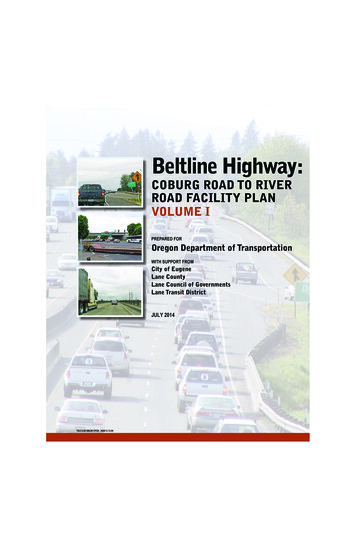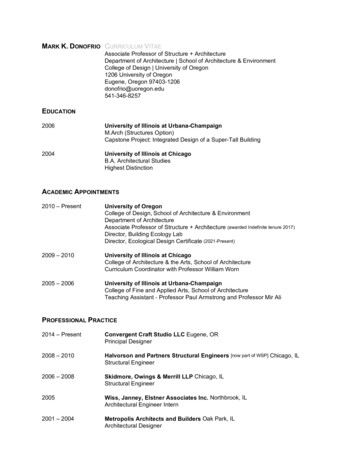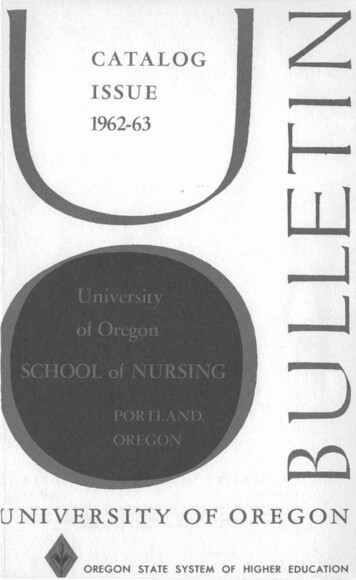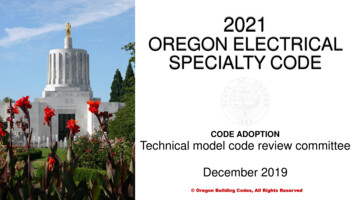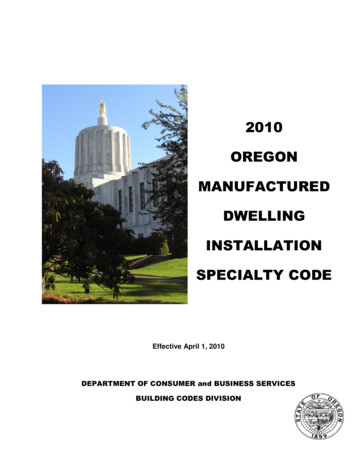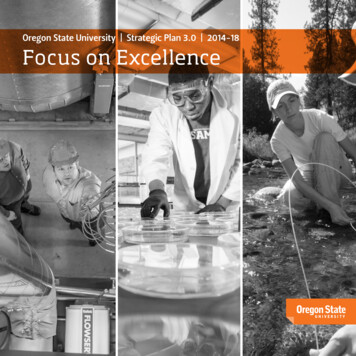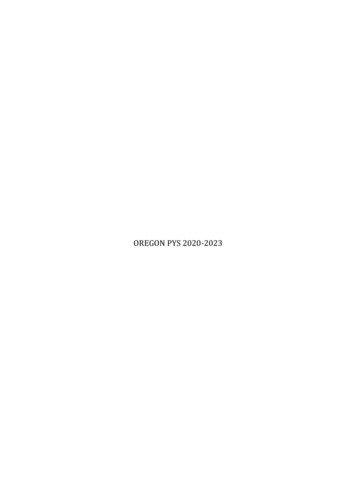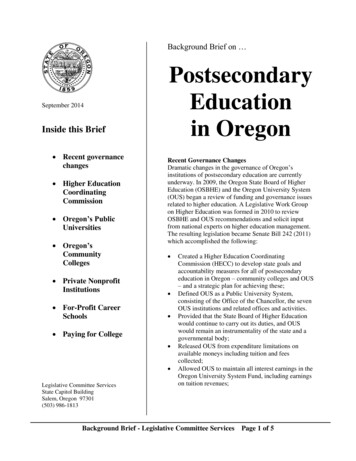
Transcription
Background Brief on September 2014Inside this Brief Recent governancechanges Higher EducationCoordinatingCommission Oregon’s PublicUniversities Oregon’sCommunityColleges Private NonprofitInstitutions For-Profit CareerSchoolsPostsecondaryEducationin OregonRecent Governance ChangesDramatic changes in the governance of Oregon’sinstitutions of postsecondary education are currentlyunderway. In 2009, the Oregon State Board of HigherEducation (OSBHE) and the Oregon University System(OUS) began a review of funding and governance issuesrelated to higher education. A Legislative Work Groupon Higher Education was formed in 2010 to reviewOSBHE and OUS recommendations and solicit inputfrom national experts on higher education management.The resulting legislation became Senate Bill 242 (2011)which accomplished the following: Paying for College Legislative Committee ServicesState Capitol BuildingSalem, Oregon 97301(503) 986-1813Created a Higher Education CoordinatingCommission (HECC) to develop state goals andaccountability measures for all of postsecondaryeducation in Oregon – community colleges and OUS– and a strategic plan for achieving these;Defined OUS as a Public University System,consisting of the Office of the Chancellor, the sevenOUS institutions and related offices and activities.Provided that the State Board of Higher Educationwould continue to carry out its duties, and OUSwould remain an instrumentality of the state and agovernmental body;Released OUS from expenditure limitations onavailable moneys including tuition and feescollected;Allowed OUS to maintain all interest earnings in theOregon University System Fund, including earningson tuition revenues;Background Brief - Legislative Committee ServicesPage 1 of 5
The 2011 Legislature passed Senate Bill 253,which redefined the mission of postsecondaryeducation in Oregon as follows:1. Ensure that at least 40 percent of adultOregonians have earned a bachelor’s degreeor higher;2. Ensure that at least 40 percent of adultOregonians have earned an associate’sdegree or postsecondary credential as theirhighest level of educational attainment; and3. Ensure that the remaining 20 percent or lessof all adult Oregonians have earned a highschool diploma, an extended or modifiedhigh school diploma, or the equivalent of ahigh school diploma as their highest level ofeducational attainment.The goal of achieving these outcomes by 2025became known as 40-40-20.Left unresolved by these 2011 measures was theauthorization of institutional governing boardssought by some representatives of Portland StateUniversity and the University of Oregon. HouseBill 4061 (2012) established the SpecialCommittee on University Governance to“recommend legislation for the creation of localgoverning boards at public universities.” Afterhearing testimony from all seven universitypresidents, OUS, OSBHE, student, faculty andother stakeholders, the Committee submitted itsRecommendations Regarding Establishment ofInstitutional Governing Boards to the Governorand the Legislative Assembly. Theserecommendations became Senate Bill 270(2013) which provides for the following: Authorizes institutional governing boards atPortland State University and University ofOregon;Provides option for Oregon State Universityto form an institutional governing board;Grants institutional governing boardsdiscrete powers including the ability to hireand fire university presidents, to issuerevenue bonds in consultation with the StateTreasurer and set tuition within limitsestablished by the Legislature.Additionally, Senate Bill 270 called for thecreation of a new Interim Committee onUniversity Governance and Operations todiscuss governance of the state’s technical andregional universities (Oregon Institute ofTechnology, Eastern Oregon University,Western Oregon University and SouthernOregon University, or “TRUs”). House Bill4018 (2014) contained the Committeesrecommendations that these four institutions alsobe allowed to form independent governingboards with the approval of the State Board ofHigher Education. All seven Oregon universitieshave chosen to exercise the option to formindependent governing boards.The Higher Education CoordinatingCommission (HECC)The Higher Education CoordinatingCommission created but not funded by SenateBill 242 was reestablished by House Bill 3120 in2013 as the single point of statewide authorityfor higher education in Oregon: For degree authorization;For licensing private career schools;For public universities for development ofbiennial budget request, allocatinglegislatively appropriated resources, andapproving mission changes and newacademic programs;For community colleges for development ofbiennial budget request, allocation oflegislatively appropriated resources andapproving new programs;For student access and financial aid foroversight of the Oregon Opportunity Grantand other financial aid programs.As of July 1, 2014, both the Department ofCommunity Colleges and WorkforceDevelopment and the Office of Student Accessand Completion operate under HECC authority.The Task Force on Integrating the Departmentof Community Colleges and WorkforceDevelopment into the Higher EducationCoordinating Commission was created torecommend legislation necessary to accomplishthis transition.Background Brief - Legislative Committee ServicesPage 2 of 5
Oregon’s Public UniversitiesEastern Oregon University (EOU) servesstudents and communities throughout Oregonwith a special focus on rural, regional anddistance learning. Programs are delivered oncampus, online and onsite in La Grande and at16 regional centers and include liberal arts,business, education and cooperative programs inagriculture, nursing and dental hygiene.Oregon Institute of Technology (OIT), theNorthwest’s only polytechnic institution, servesthe state with programs in business, engineeringand health technologies, and cooperativeprograms in dentistry and nursing.Oregon State University (OSU) is a land, space,sea, and sun grant university with programs inthe liberal arts and sciences and professionalprograms in agricultural sciences, business,education, engineering, forestry, health andhuman sciences, oceanography, pharmacy, andveterinary medicine. The OSU-Cascades campusin Bend opened in 2001, in partnership withCentral Oregon Community College, and offersdegree programs in arts and sciences, business,engineering, education, natural resources, andrecreation.Portland State University (PSU) is a diverseurban university offering liberal arts andsciences programs and professional programs infine and performing arts, liberal arts andsciences, business administration, education,urban and public affairs, social work,engineering and computer science.Southern Oregon University (SOU) providesliberal arts and sciences programs, professionalprograms in business, education, and performingarts, and a cooperative program in nursing.University of Oregon (UO) is an Association ofAmerican Universities liberal arts and sciencesuniversity with professional programs inarchitecture and allied arts, business, education,journalism, law, music and performing arts, andplanning and public policy.Western Oregon University (WOU) providesprograms in liberal arts and sciences,professional programs in education, business,and public services, and a cooperative programin nursing.Oregon Health & Science University (OHSU),is the only academic medical center in the stateand primarily operates on its main campusadjacent to downtown Portland. The LegislativeAssembly established OHSU as a publiccorporation with academic programs and feesoverseen by its board. (Not included in chart.)UniversityLocationFall 2013Enrollment4,1572013/2014Tuition/Fees 7,460EasternOregonUniversityOregonInstitute ofTechnologyOregon StateUniversityOregon StateUniversity CascadesPortland onUniversityUniversity ofOregonLa GrandeKlamathFalls4,414 8,457Corvallis27,925 8,258936 7,007Portland28,766 7,798Ashland6,140 7,712Monmouth6,188 8,90625,548 9,682TotalEnrollment103,074AverageTuition/Fees 8,161BendEugeneOregon’s Community CollegesOregon’s community colleges offer a range ofacademic, workforce, and other programs andservices, including professional technicalprograms, coursework for degree-seeking andupper division college-bound students,workforce training, coursework for generaleducational development and adult high schooldiploma completion, English as a SecondLanguage, adult basic education, and non-creditgeneral education courses. Each of Oregon’s 17community colleges is governed by a presidentand local community college board.Background Brief - Legislative Committee ServicesPage 3 of 5
CollegeBlue mbiaGorgeKlamathLaneLinn-BentonMt. HoodOregon CoastPortlandRogueSouthwesternTillamook BayTreasureValleyUmpquaMainCampusPendletonBendFall 2013Enrollment3,1219,1292014/2015Tuition/Fees 4,576 geneAlbanyGreshamNewportPortlandGrantsPassCoos BayTillamookOntario16,8149,870 4,230 4,1321,8921,402 4,995 4,5451,891 4,60514,1129,61213,91890741,5726,827 4,920 4,476 4,751 4,770 4,476 4,6803,8919402,688 5,337 4,680 5,0854,630TotalEnrollment143,216 4,372AverageTuition/Fees 4,640RoseburgPrivate Nonprofit InstitutionsOregon is also home to a number of highlyranked independent nonprofit colleges anduniversities. Since it is estimated that as manyas 25% of undergraduate degrees granted inOregon are earned at these institutions, the staterecognizes the critical role they play in pursuitof 40-40-20. The Office of DegreeAuthorization (ODA) is required by statute “toprovide for the protection of the citizens ofOregon and their postsecondary schools byensuring the quality of higher education andpreserving the integrity of an academic degreeas a public credential.” Under direction of theHECC, ODA administers laws, standards andservices enacted to protect students, holders oflegitimately earned degrees, institutions,businesses, employers, patients, clients andlicensing boards. All degree-granting privatepostsecondary institutions offering academicprograms in Oregon, or to Oregon studentsfrom outside the state, must be approved by theODA.For-Profit Career SchoolsThe Private Career School licensing unit (PCS),also operating under the auspices of the HECC,regulates the activities of non-degree grantingpostsecondary institutions. There are over 200such entities currently operating in Oregon toprepare students for specific professions such asreal estate broker, tax preparer andcosmetologist. In addition to licensing careerschools, PCS registers individuals who teach incareer schools, approves new instructionalprograms, responds to student complaints andmanages the Tuition Protection Fund. Inrecognition of contributions to the “middle 40”of 40-40-20 made by career schools, PCS worksto: Ensure Oregon’s licensed career schoolsmaintain a high level of quality; help careerschools be successful providers of careertraining and protect students’ investment oftime and money.Paying for CollegeThe Office of Student Access and Completion(OSAC) provides access to postsecondaryeducation opportunities through information,mentoring and financial support under theHECC. OSAC administers the followingprograms which deliver over 118 millionannually in financial aid: Scholarships Oregon Opportunity Grant Chaffee Grant Childcare Grant ASPIRE (Access to Student AssistancePrograms in Reach of Everyone)Additionally, the Legislative Assembly hasdirected the HECC to study a number ofinitiatives to address increasing tuition andstudent loan debt. The HECC has also beentasked with developing a clearinghouse forinformation to allow students to compare therelative value of similar programs offered byvarious institutions operating in Oregon.Background Brief - Legislative Committee ServicesPage 4 of 5
Staff and Agency ContactsVictoria CoxLegislative Committee Servicesvictoria.cox@state.or.us503-986-1664Dana RichardsonHigher Education Coordinating Commissiondana.richardson@state.or.usKrissa CaldwellOregon Dept. of Community Collegesand Workforce Developmentkrissa.caldwell@state.or.usCommittee Services provides centralized, nonpartisan research and issue analysis for theLegislative Branch. Committee Services does notprovide legal advice. Background Briefs are intendedto give the reader a general understanding of asubject, and are based on information which iscurrent as of the date of publication. Legislative,executive, and judicial actions subsequent topublication may affect the timeliness of theinformation.Background Brief - Legislative Committee ServicesPage 5 of 5
and public services, and a cooperative program in nursing. Oregon Health & Science University (OHSU), is the only academic medical center in the state . Chemeketa Salem 16,814 4,230 Clackamas Oregon City 9,870 4,132 Clatsop Astoria 1,892 4,995 Columbia Gorge The Dalles 1,402 4,545 Klamath Klamath Falls .

